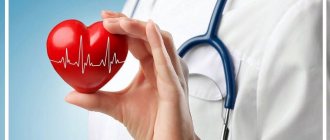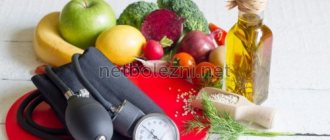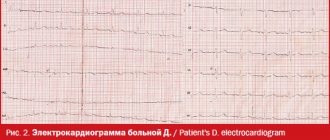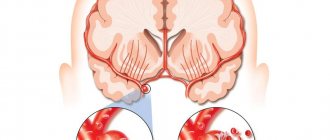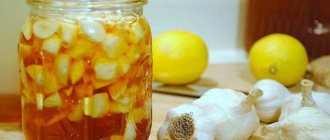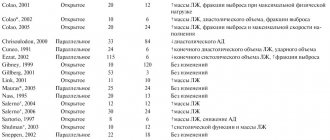Collection of folk recipes for the treatment of diseases of the cardiovascular system
For arrhythmia (irregular heart rhythm)
— To prepare the medicine, you need to mix 30 drops of yarrow tincture (you can use a pharmaceutical preparation) with 30 drops of grape or fortified wine or mint juice. Use for 1 month, 3 times a day. Yarrow helps remove water, stones, sediment and toxins from the body. It stimulates the nervous system well. But we must remember that
the plant is poisonous. See beneficial properties and contraindications.
— To prepare the medicine, you need to add 100 g of vodka to 10 g of hawthorn (fruit), leave for 10 days, filter. Use before meals, 3 times a day, 30 drops with water for atrial fibrillation, paroxysmal tachycardia, functional disorders, angioneurosis. See beneficial properties and contraindications.
— From 3 to 5 times a day, take 150 g of honey orally for 2 months, for arrhythmia, myocarditis, myocardiosclerosis, cardiac and bronchial asthma, emphysema. There are contraindications.
— To prepare the medicine, you need to put 1 tbsp in a glass of water. l. hawthorn (fruit), boil for 15 minutes, leave for 2 hours, wrap, filter. Drink a glass of tea 3 times a day for arrhythmia, atherosclerosis, coronary heart disease. See beneficial properties and contraindications.
— To prepare the medicine, you need to add 100 g of vodka to 10 g of hawthorn (flowers), leave for 3 weeks in the dark, filter, squeeze. Take 25 drops half an hour before meals, 3 times a day. It is best to take 7 drops with water. Take so that everything is thoroughly mixed in your mouth with saliva. You can take hawthorn tincture together with valerian tincture. Used for arrhythmia, atherosclerosis, coronary heart disease. See beneficial properties and contraindications.
— Hawthorn fruit jam: Grind or crush ripe fruits with sugar 1:1. Used all winter. The attacks usually stop. Used for arrhythmia, atherosclerosis, coronary heart disease.
— To prepare the medicine, you need to wash half a kilogram of hawthorn fruit, crush it, add 100 g of water, then heat it to 40 degrees and press it with a juicer. Drink this juice before meals, 1 tbsp. l, 3 times a day. It has a beneficial effect on the functioning of the heart, and is especially useful for elderly people, it prevents wear and tear of the heart muscle and overexertion. See beneficial properties and contraindications.
- To prepare the medicine you will need hawthorn flowers - 5 parts, knotweed (herb) - 3 parts and 2 parts horsetail. Grind everything and mix. 2 tsp. collection in a glass of boiling water, leave for 2 hours, filter. Take small sips throughout the day for heart weakness. This remedy well calms the excitability of the central nervous system, eliminates arrhythmia, tachycardia and enhances coronary circulation, reduces blood pressure. See beneficial properties and contraindications.
— To prepare the medicine, you need to put 2 tsp in 2 cups of boiling water. calendula (flowers), leave for an hour, filter. Drink half a glass 4 times a day in case of heart rhythm disturbances. Calendula is added to salads, teas, soups, drinks and dressings. Flowers are used for tea leaves. They contain the most useful elements. There are fewer of them in leaves and stems. The root is practically not used in treatment. It is necessary to collect in July - August.
— Peach juice is prescribed for anemia, heart rhythm disturbances, stomach diseases with low acidity, and constipation. Drink a quarter glass of freshly squeezed juice half an hour before meals. Juice is contraindicated for allergies, diabetes, obesity. See beneficial properties and contraindications.
— Powder from the dry plant of the yellow grass is taken at the tip of a knife and stirred in 30 g of water. Drink one sip before meals 15 minutes. Use 3 times a day. See beneficial properties and contraindications.
— To prepare the medicine, you need to add 300 g of water to 30 g of beans (dry pods), boil for 15 minutes over low heat, leave for 1 hour, filter. Take 40 g half an hour before meals, 3 times a day. See beneficial properties and contraindications.
- To prepare the medicine you need 2 tsp. watch three-leaved (herb) add a glass of boiling water. Infuse for 20 minutes in a thermos, strain, and squeeze. Drink a quarter glass before meals, 4 times a day. See beneficial properties and contraindications.
— To prepare the medicine, you need to put 20 g of dried strawberry leaves and berries in a glass of water and boil for 10 minutes over low heat. Infuse for 2 hours, filter. Use 1 tbsp before meals. l, 3 times a day. See beneficial properties and contraindications.
— To prepare the medicine, you need to put 20 g of tricolor violet (herb) in a glass of boiling water, leave for 1 hour, filter. Take 100 g, 2 times a day. See beneficial properties and contraindications.
— To prepare the medicine, you need to put 2 tsp in 2 cups of boiling water. calendula (flowers), leave for an hour, filter. Drink half a glass before meals, 4 times a day in case of heart rhythm disturbances.
— To prepare the medicine, you need to put 2 tsp in a glass of cold water. lumbago (herb), leave overnight, filter. Drink a quarter glass before meals, 3 times a day.
— To prepare the medicine, you need to put 15 g of yarrow (herb) in a glass of water, boil for 15 minutes over low heat, leave for 1 hour, filter. Take 1 tbsp before meals. l, 3 times a day. See beneficial properties and contraindications.
— To prepare the medicine you need 1 tbsp. l. horsetail, add 300 g of boiling water, leave for 2 hours, filter. Use 1 tbsp. l, 5 times a day. See beneficial properties and contraindications.
— To prepare the medicine, you need to grate the turnip root and add 2 tbsp. l. add a glass of boiling water, cook for 15 minutes over low heat, cool, filter. Drink half a glass, 4 times a day. See beneficial properties and contraindications.
— To prepare the medicine, you need to add 15 g of lemon balm to a glass of boiling water, leave for half an hour, filter. Use 2 tbsp. l, 5 times a day. See beneficial properties and contraindications.
— To prepare the medicine, you need to add 20 g of dried dried grass (herb) to a glass of boiling water, leave for 1 hour, filter. Use 1 tbsp. l, 5 times a day.
— To prepare the medicine, you need to prepare 2 tbsp. l. valerian (root) and motherwort (herb), 1 tbsp. l. anise (fruit) and yarrow (herb). Mix all. Add 1 tbsp to a glass of boiling water. l. mixture, leave for half an hour, filter. Drink a third of a glass, 3 times a day. See beneficial properties and contraindications.
— To prepare the medicine, you should take equal parts of valerian (root), motherwort (herb), caraway fruits and dill fruits. Mix everything thoroughly. Add 1 tsp to a glass of boiling water. mixture, leave for half an hour, filter. Drink a third of a glass, 3 times a day. See beneficial properties and contraindications.
— To prepare the medicine, you need to add 1 tsp to 2 cups of boiling water. elecampane (root), boil for 15 minutes over low heat, filter. Use 2 tbsp every hour. l. during the day. See beneficial properties and contraindications.
— Prepare a mixture of juices from fresh herbs, yarrow and rue. The mixture of juices is made in a 1:1 ratio. This juice should be consumed 25 drops with a quarter glass of boiled water. The juice must be freshly prepared each time. See beneficial properties and contraindications.
- Mix half a liter of vodka and 0.5 kg. honey Heat the mixture, stirring continuously. When a white film forms, remove from heat. Take 1 tsp. without the top of motherwort herb, valerian root, bird's knotweed, marshweed and chamomile, grind in a mortar and pour 1 liter. boiling water, after 15 minutes of infusion, strain, and combine with vodka and honey. Place in the dark for 3 days, then pour into bottles and refrigerate.
During the first week, take 1 tsp in the morning and at night. 2nd week - 1 tbsp. l. Take a break for a week and repeat this course, taking 1 tbsp. l. 2 weeks later, another break for a week. Complete 3 courses in total. See beneficial properties and contraindications.
— To prepare the medicine, you need to wash 0.5 kg. oats and add 0.5 l. milk. Cook for 5 minutes and let cool. Strain and you can take it. Drink small portions throughout the day. Do this for a week. During this treatment, before meals, 3 times a day, eat a quarter of a loaf of rye bread with mustard. The arrhythmia should stop, but after six months this course must be repeated. Oats contain the optimal ratio of carbohydrates, fats and proteins for humans.
— To prepare the medicine, you need to grate 0.5 kg along with the peel. lemons and add 0.5 kg. honey Add 3 chopped apricot kernels to this mixture and mix. Take 1 tbsp morning and evening before meals. l. See beneficial properties and contraindications.
— Beans as food for arrhythmia, atherosclerosis.
— If you have a strong heartbeat, if you don’t have any medicine at hand, you need to close your right nostril with your fingers and breathe heavily with your left. After some time, the heartbeat returns to normal.
- If you have a strong nervous palpitation, you need to lie down with a small pillow under your head, put a cold compress on the heart area and drink 20 drops of valerian tincture with water. You can take a 30-minute warm bath with sea salt.
— For strong heart palpitations due to nervousness: pour 10 g of the whole magnolia grandiflora plant into 100 g of 70% alcohol and leave in a warm place for 2 weeks. During this time, the tincture should be shaken periodically. When ready, strain. Take 30 drops with meals, 3 times a day. Treatment lasts 1 month with constant monitoring of blood pressure.
Prevention and treatment of acute intestinal infections
During bathing, we willy-nilly (and small children even on purpose) swallow water along with living organisms. In the vast majority of cases, such an invasion goes unnoticed, since our body has several degrees of protection, more powerful than that of a bank note. But sometimes the defense system fails, which provokes an acute intestinal infection.
When mentioning the dangers lurking in bodies of water, one cannot ignore the topic of the inhabitants of these bodies of water. We will talk about the most dangerous creatures inhabiting our rivers - piranhas. Oh, no, it’s a joke - piranhas are a little further south.
In fact, my story, of course, is about bacteria, about the prevention and treatment of intestinal infections. Sometimes you are surprised when we, so big and strong, who have inhabited all corners of the planet and even a piece of space, die from microscopic creatures. I remember the film “War of the Worlds” by Wells, where even the healthiest aliens gave in to germs.
However, I can’t vouch for aliens, but people have something to counteract harmful microorganisms. Our saliva contains a substance (lysozyme) that complicates the life of bacteria even when it enters the mouth. The lymphatic ring in the oral cavity, being a peripheral organ of the immune system, also reliably protects against the penetration of aggressive creatures. And gastric juice is aggressive to almost any flora. But under certain conditions (immature immune system in children, immunodeficiency, elderly people, alcoholics) bacteria take over, causing acute intestinal infections.
Where does the infection come from?
Life is seething in reservoirs, invisible to our eyes, and this life will gladly take advantage of the bodies of careless bathers. Intestinal infection is the most common problem of the summer season. Strictly speaking, acute intestinal infection occurs not only from swimming. This is a problem of unwashed hands, vegetables, fruits, and poorly processed food. The cause of intestinal infection is pathogenic bacteria (occasionally viruses and fungi).
By the way, in our digestive tract there are also beneficial bacteria (bifidobacteria, lactobacilli, etc.), in other words, obligate flora. They participate in digestion, the production of enzymes, vitamins, and compete with pathogenic flora, suppressing its development.
Conditionally pathogenic microorganisms (streptococci, Proteus, E. coli, etc.) also live inside the body, and if the immune status is preserved, they are harmless to us. But they can cause disease if the immune system is weakened.
But bacteria that enter from the outside are pathogenic flora. The diseases they cause are yersiniosis, salmonellosis, typhoid fever, cholera, etc. - can pose a serious threat to life.
How does the disease manifest itself?
At first, microbial invasion manifests itself... but does not show anything. The incubation period lasts about two days, the time that the victim has to solve the last matters while the harmful microbes multiply and accumulate poisons. Then there is intoxication, fever, aching joints - for a day an incomprehensible condition that can be confused with the flu or something else.
This is followed by the flourishing of intestinal infection. These are, as a rule, spasmodic pain in different parts of the abdomen, repeated vomiting and, of course, repeated loose stools. Sometimes the liquid pours out of a pipe - like with cholera. Sometimes with an admixture of blood - as with dysentery. The degree of dehydration reaches extreme values, threatening the patient's life.
Dehydration is especially severe in young children. Very often such babies are brought to our department. The eyes are sunken, the cry is weak, the skin is as dry as a shoe. There is no time for jokes, life hangs by a thread.
Factors determining the severity of the condition:
- type of bacteria
(from staphylococcus only six times diarrhea, and from vibrio cholerae it will flow like from a fire hose until complete dehydration); - the number of bacteria
that have entered the body (a hundred or two will do nothing, but a colony of several thousand individuals will certainly cause suffering); - state of health
before an infectious lesion (a healthy person will run to the toilet and only become healthier, but the heart will have a worse time).
You need to stop self-medicating and herbal eating and immediately consult a doctor if: - The above symptoms are observed in preschool children, elderly people over 60 years of age and in people with chronic diseases of the cardiovascular and respiratory systems. — Frequent, loose stools more than 5 times in adults. — There is an admixture of blood in the stool and vomit. - High fever with diarrhea and vomiting. - Cramping pain in the abdomen of any location, lasting more than an hour. - Vomiting after any meal or water. - Marked weakness and thirst.
What to do at home?
- First of all, you need to replenish dehydration.
Drinking is what you need!
If you cannot replenish dehydration with this method (vomiting or retching occurs), call an ambulance. How much should you drink? Until the thirst subsides. It's simple - drink while you want. The risk of overloading yourself with liquid is minimal. If you have concomitant pathology of the kidneys or heart, call an ambulance! Drink clean, bottled water. You can replenish the fluid with a solution of rehydron
- although it is terribly disgusting, but useful in microelements. - Enterosorbents.
Activated carbon, enterodesis and all sorts of similar tasteless, but useful and safe drugs. - If it is impossible to call a doctor, and vomiting worsens dehydration, find Cerucal (metoclopromide)
. - Medicines for intestinal disorders will be needed, if the disease does not recede, antibacterial drugs will be needed: the bacteria must be killed. The choice of drugs depends on the possible pathogen, the severity of the condition, the urgency of the situation, and the patient’s allergies. Therefore, “self-prescribing” medications is not a good idea. But if you do not have the opportunity to see a doctor, in a difficult situation (hiking, tourist trip) the best option is furazolidone
. This is something you can keep in your first aid kit. Take 0.1–0.15 g after meals, 4 times a day for adults. For children - 10 mg/kg body weight per day (daily dose is divided into 3-4 doses). Take no more than 10 days. - About food. In the acute period, it is better not to eat, but to drink, drink, drink. When it becomes a little easier, you can have low-fat broths and crackers. But the acute period must be endured.
- If you have abdominal pain, it is better not to take painkillers - do not erase the picture of the disease, in case you have appendicitis!
- If you have diarrhea, you should not take astringents such as imodium or loperamide - the body must get rid of toxins and bacteria.
And in conclusion, although this is trivial, I repeat: wash your hands before eating, wash vegetables and fruits, prepare food from quality ingredients. It's so simple, but incredibly effective. Be healthy!!!
Vladimir Shpinev
Photo thinkstockphotos.com
Products by topic: [product](rehydron), [product](activated carbon), [product](enterodesis), [product](cerucal), [product](furazolidone), [product](imodium), [product] (loperamide)
